The idea for an organisation specifically designed to promote cruising in Northern Europe was first floated by Anne Dunderdale in the Fontainebleau Hotel Miami Beach during the Seatrade Cruise Shipping Convention and Exhibition in March 1990. She was accompanying her husband Iain who was there to promote Invergordon, a port in Cromarty Firth.
He happily remembers a visit from Brendan Corrigan of Carnival Cruise Line who visited the stand then and every year thereafter until he retired. “Although it would be 20 years before the first Carnival ship called at Invergordon,” he told me recently. Other regular visitors were Herman van Deursen from Holland America Line, Mike Ronan and Rick Strunck from Royal Caribbean and Michael Pawlus, then working for Royal Viking Line which was the only cruiseline to venture to visit Northern Europe at that time.
Michael Pawlus is now director of strategic itinerary & destination planning at Azamara, and commented: “I have been designing itineraries for 30 years now and Cruise Europe has been a valuable association for me as a source of port and destination information through the years as well as a great mechanism to establish relationships in the region.”
Having previously worked in the tourism business, Anne suggested it might be a good idea to form an association of ports to market the whole of Northern Europe as a cruise destination, principally to the US cruise operators who at that time concentrated on the Caribbean and Alaska and had little idea of what Europe could offer.
The following year a working party drawn from the ports of Bergen, Cork, Cromarty Firth, Ghent, Oslo, Rouen and Tilbury distributed a business prospectus to potential members under the working title of the North European Ports Co-Operative. Back then the idea, quite simply, was to encourage more cruise visits to the area and extend the season beyond June, July and August.
In December 1991 in Copenhagen the fledgling cooperative was formally constituted at an Extraordinary General Meeting at which 21 port members joined together under the title of Cruise Europe.
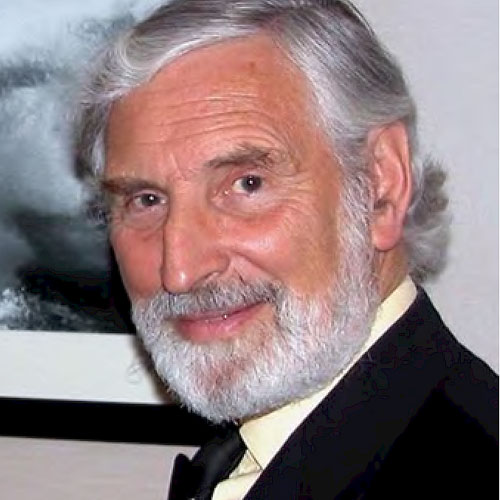


Aris Zarpanely from Equity Cruises was elected president, Mike Meyjes from the Port of Tilbury became the first executive manager and Lord Ambrose Greenway from Eurolist Ltd, which worked closely with Tilbury and Le Havre amongst others, volunteered to be secretary/treasurer.
The first council members were Bodil Andersen from Trondheim, Nils Standal from Bergen, Iain Dunderdale from Cromarty Firth, Sean Geary from Cork, Andre de Wilde from Ghent, Per Schmidt from Copenhagen, Jan Koster from Amsterdam and Mike Deeks from Falmouth.
The official launch took place at the Seatrade Cruise Convention in Miami which began in 1985 with just 200 attendees but now numbered 3,500. The first CE exhibition stand with four booth spaces cost £8,300 (€9,760) and so began the annual tradition of members sharing a stand.
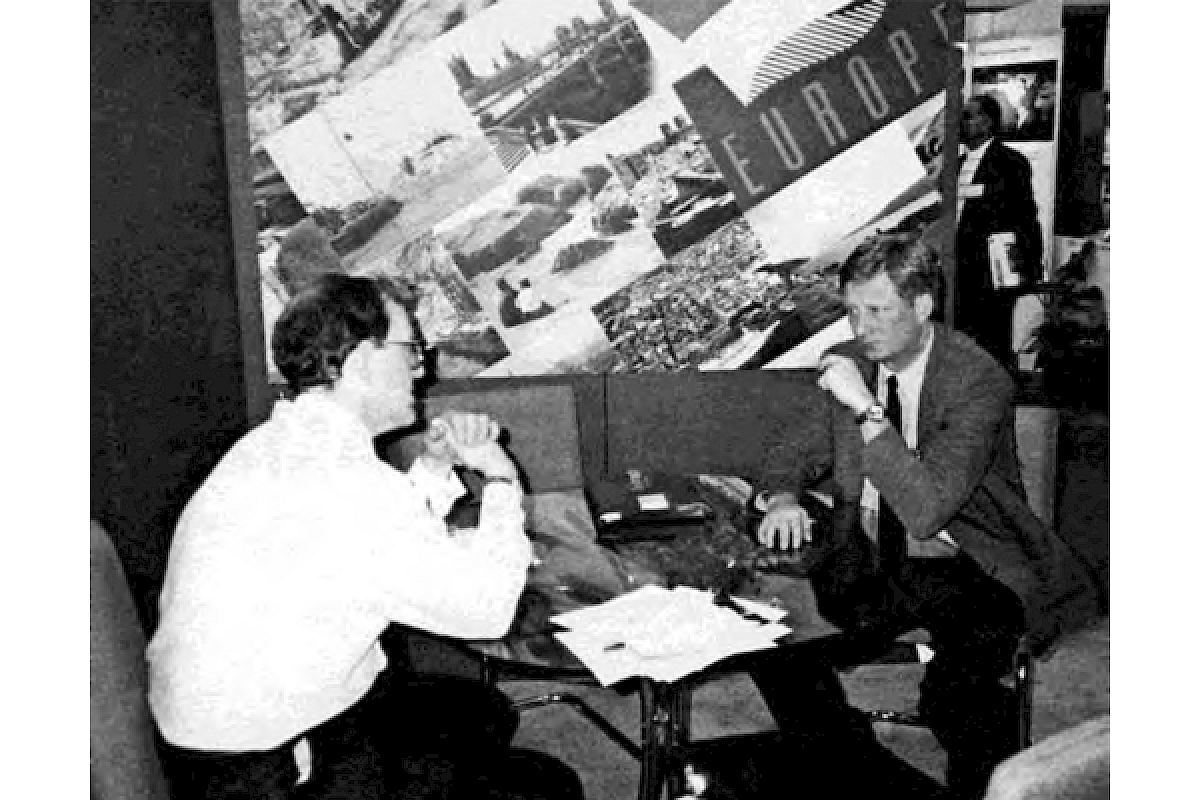
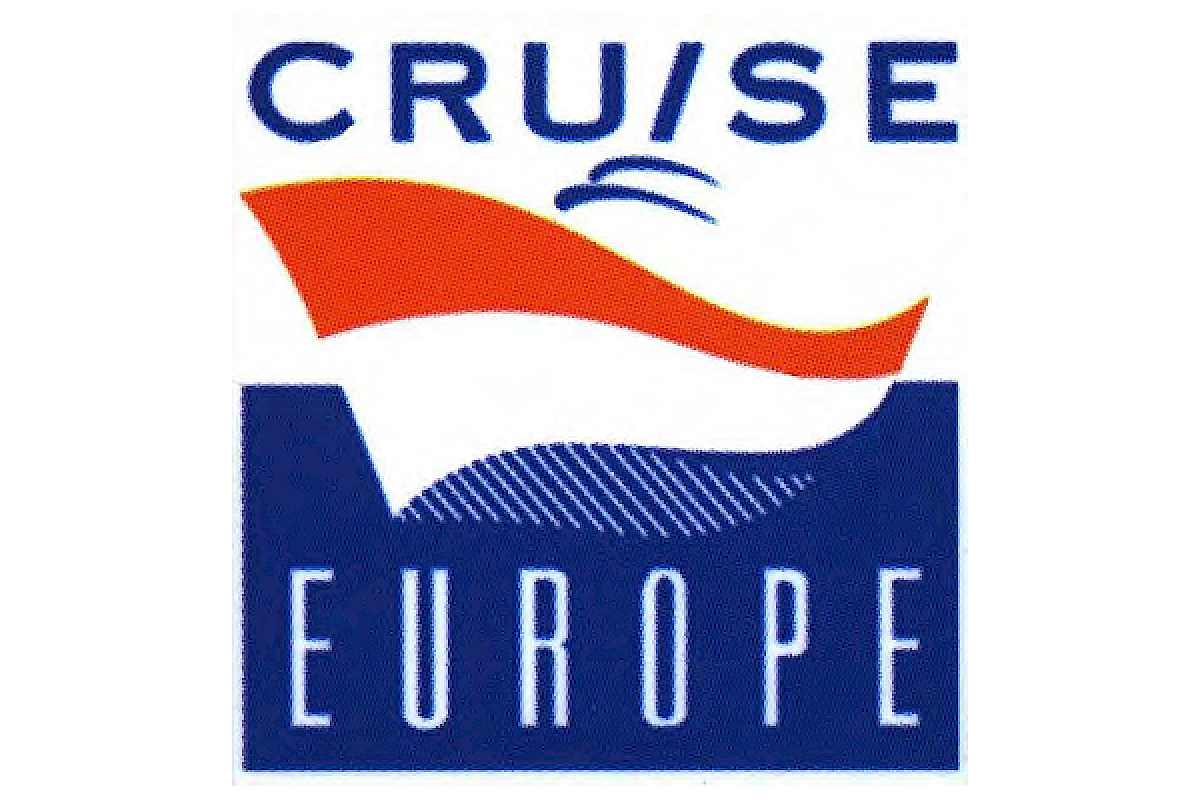
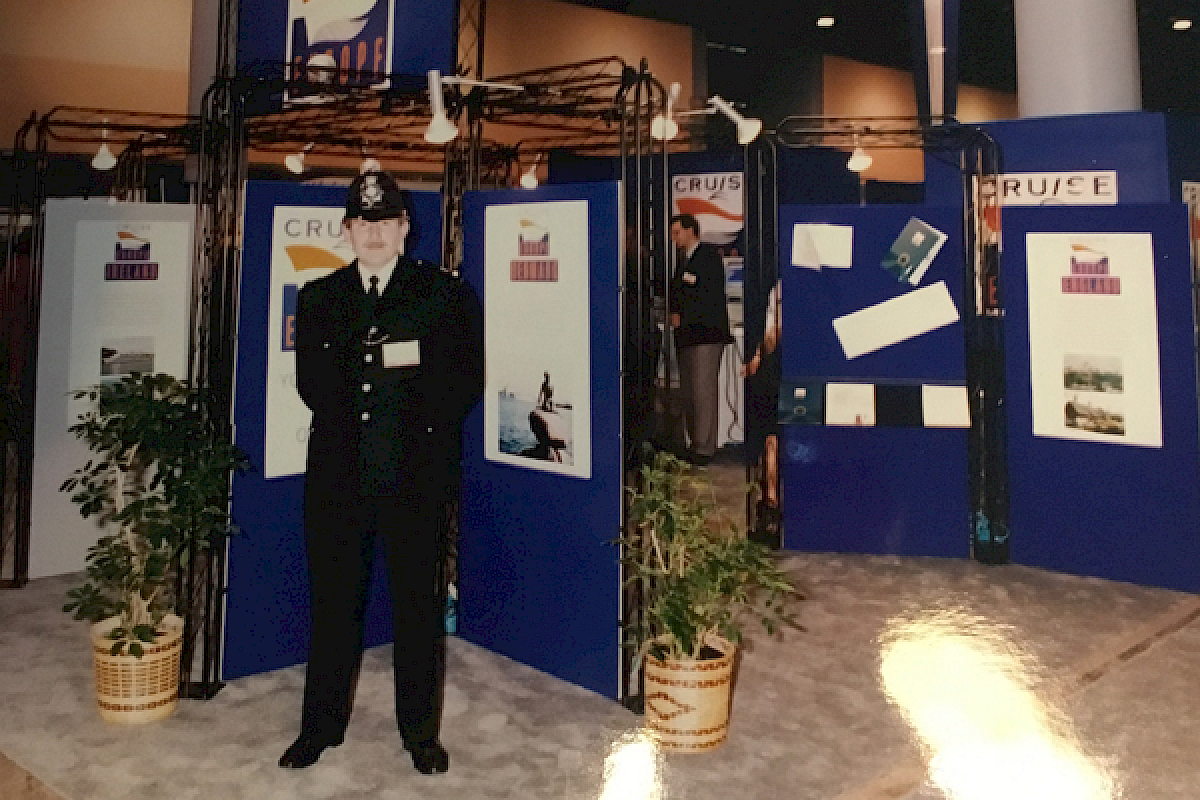
Three members made presentations, with Jean Werbowy from the Port of Rouen saying: “Europe is truly a whole wealth of untapped beauty and centres of interest to discover - the New World is in Europe as far as the future development of the cruise industry is concerned”. How right he was.
It was during the conference that Tim Harris, then ceo of P&O Cruises, commented that over the next decade cruising would become a truly worldwide industry, though the Caribbean would still remain its main volume base.
That same year the first newsletter was produced and Meyjes and Lepsoe made the first visit to US cruiselines to promote CE and its members. It was a while before the first US road trip with a group of members took place in 1995.
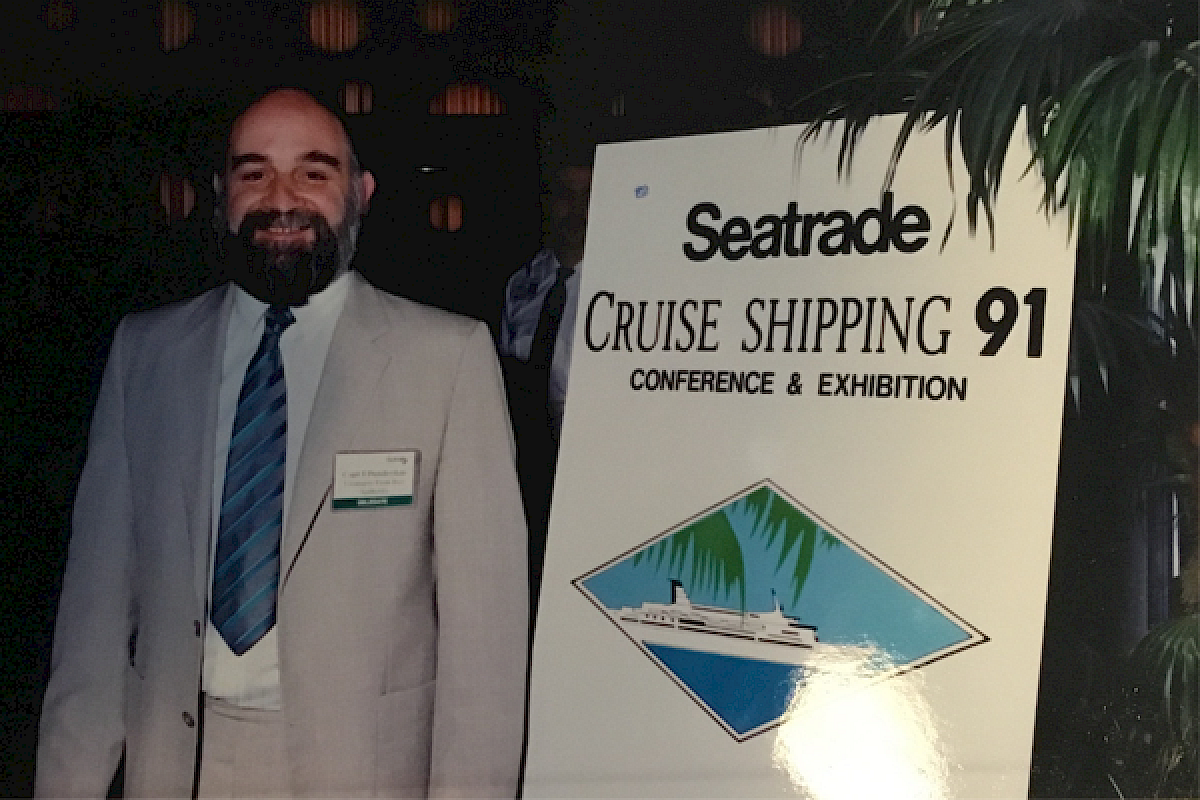
In November 1992 the first AGM was held at the Marriott Hotel in Amsterdam. Membership had grown to 40 ports from 31 at the time of the launch.
Nigel Lingard, cruise industry management consultant and more recently moderator at CE conferences, was a keen supporter of the ‘ports consortium’ concept from the outset, and well remembers initial discussions with Ambrose Greenway and founder members.
“I think I may have attended every AGM since then,” he told CE. “At Fred. Olsen we were expanding the fleet, whilst looking for smaller ports in order to differentiate our product. CE gave potential cruise call ports an opportunity to reach out to us and demonstrate their USPs; whilst the annual meetings put faces to the names and helped to reassure cruiselines of the port management’s credibility. This process is, I believe, still as important as ever.”
It was in 1993 that Costa Cruises dipped its toes in the North European market for the first time, bringing with Daphne and Enrico Costa to its shores. High demand led to the larger Costa Allegra replacing Daphne the following year.
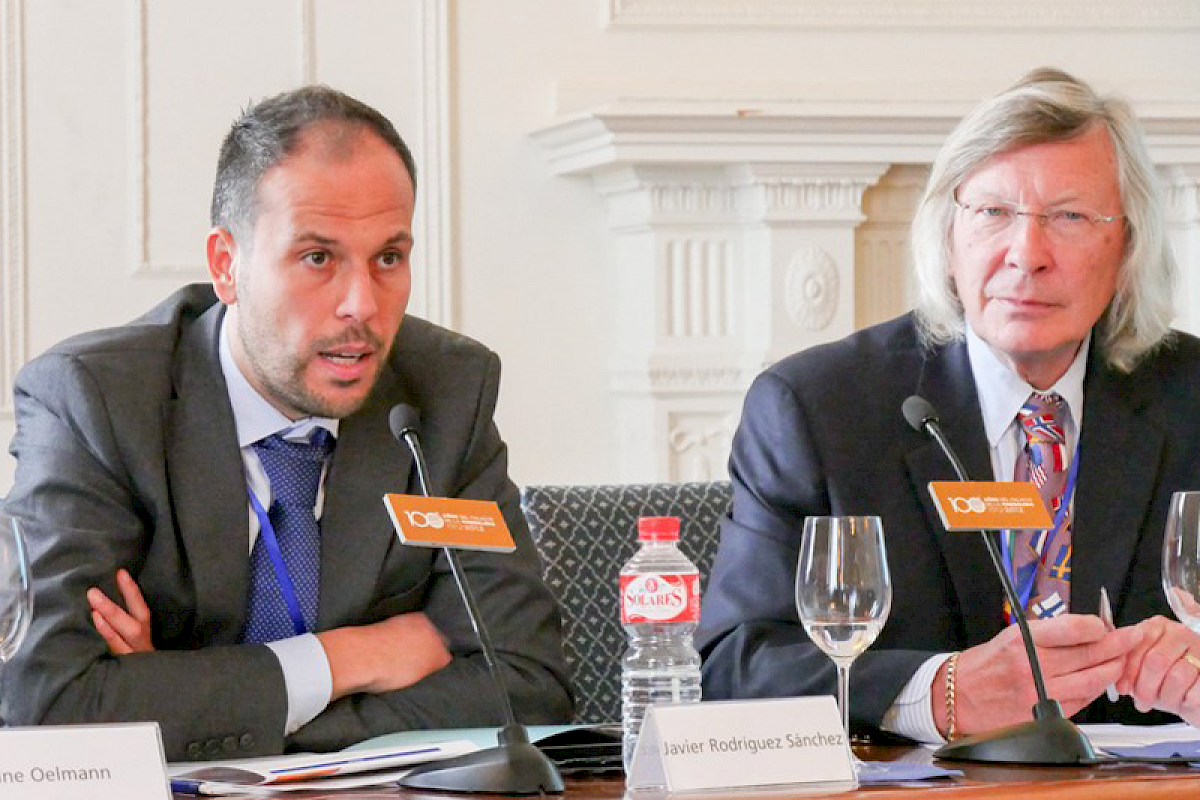
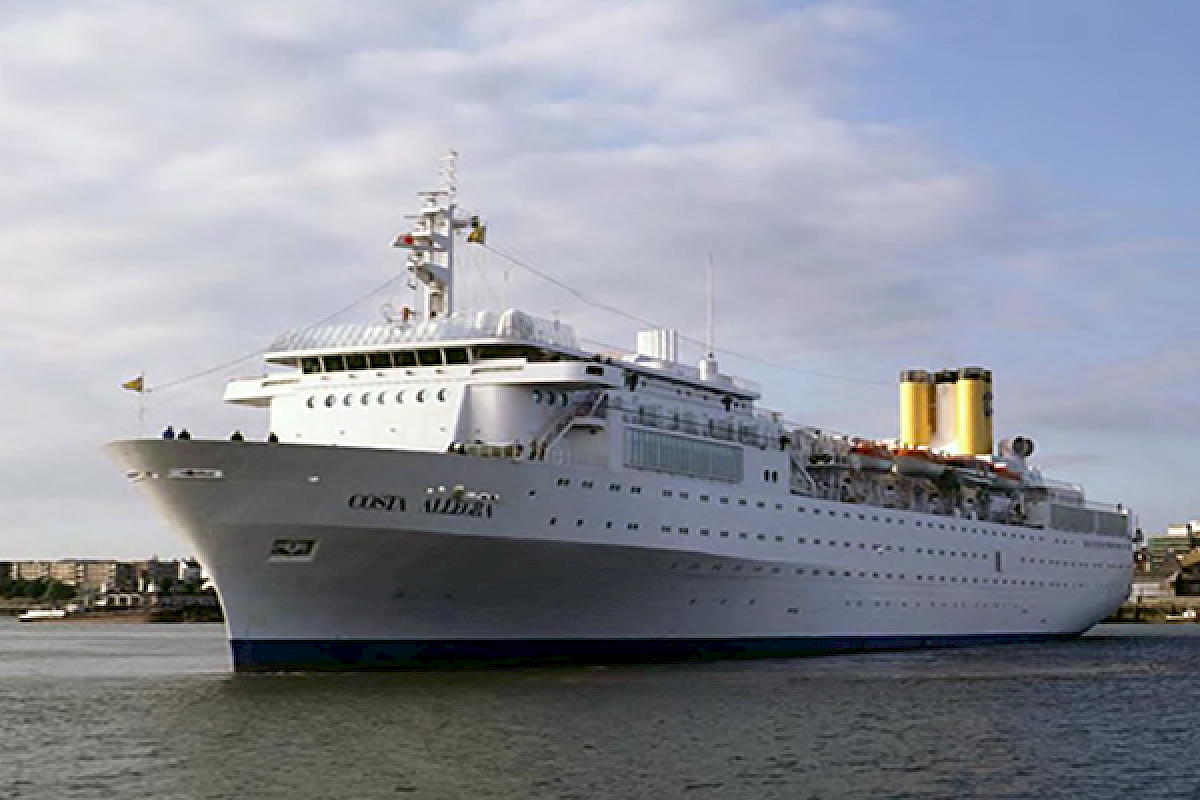
“I think I may have attended every AGM since then,” he told CE. “At Fred. Olsen we were expanding the fleet, whilst looking for smaller ports in order to differentiate our product. CE gave potential cruise call ports an opportunity to reach out to us and demonstrate their USPs; whilst the annual meetings put faces to the names and helped to reassure cruiselines of the port management’s credibility. This process is, I believe, still as important as ever.”
It was in 1993 that Costa Cruises dipped its toes in the North European market for the first time, bringing with Daphne and Enrico Costa to its shores. High demand led to the larger Costa Allegra replacing Daphne the following year.
At that time Rod Mcleod, evp Royal Caribbean and chairman of Cruise Lines International Association, made a telling point in his keynote address at Seatrade. He talked about a ‘virtually untouched passenger source market in the nations of Western Europe … a market of more than 300 million people that have the time, the money and a strong inclination to vacation travel’. And so began the move east across the pond.
By now the press had picked up on the association’s presence. Lloyd’s List and International Cruise Review both published special features. At about this time the port of Reykjavik offered to produce a quarterly newsletter at its own expensive with Agust Agustsson volunteering to be editor.
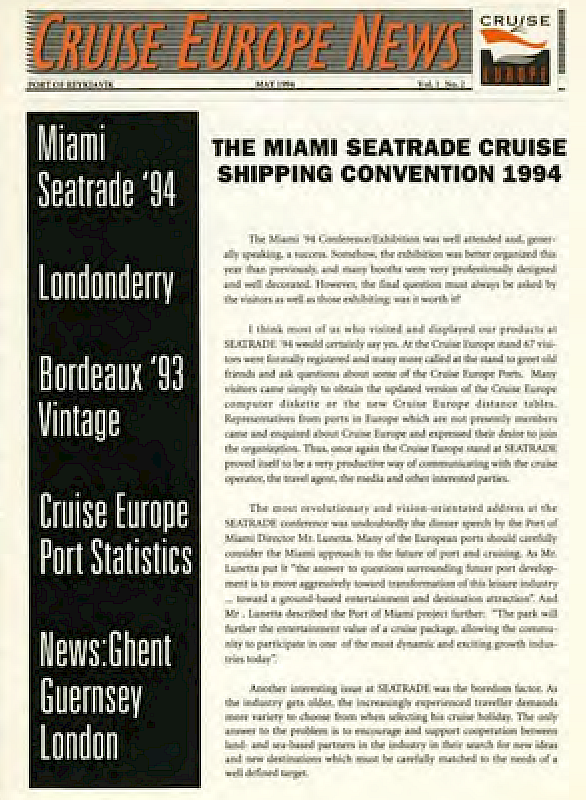
At the 1994 AGM in Guernsey, speakers from the cruise industry attended for the first time. These included Mark Beaumont, svp Cunard and Nigel Lingard, director of cruise operations Fred Olsen Cruise Lines, who was and has remained a stalwart supporter ever since.
A computer diskette (do you remember these!) was produced including distance tables of some 88 ports between Akureyri in the north and Cadiz in the south. It was here that plans for a yearbook showcasing member ports were hatched. The first was published in 1995, the year CE first exhibited at Seatrade Europe in Genoa.
In 1996 CE was already looking ahead and considering placing the diskette and yearbook data on a CD-Rom or on the Internet even though only some 10% of members were using email at that time! So hard to comprehend 25 years on when Zoom/Teams meetings have become the norm.
During this year Royal Caribbean’s Splendour of the Seas was home-ported in Harwich and Dover opened a £9 million (€10.6 million) cruise terminal in the old railway station in the presence of Cunard’s Royal Viking Sun.
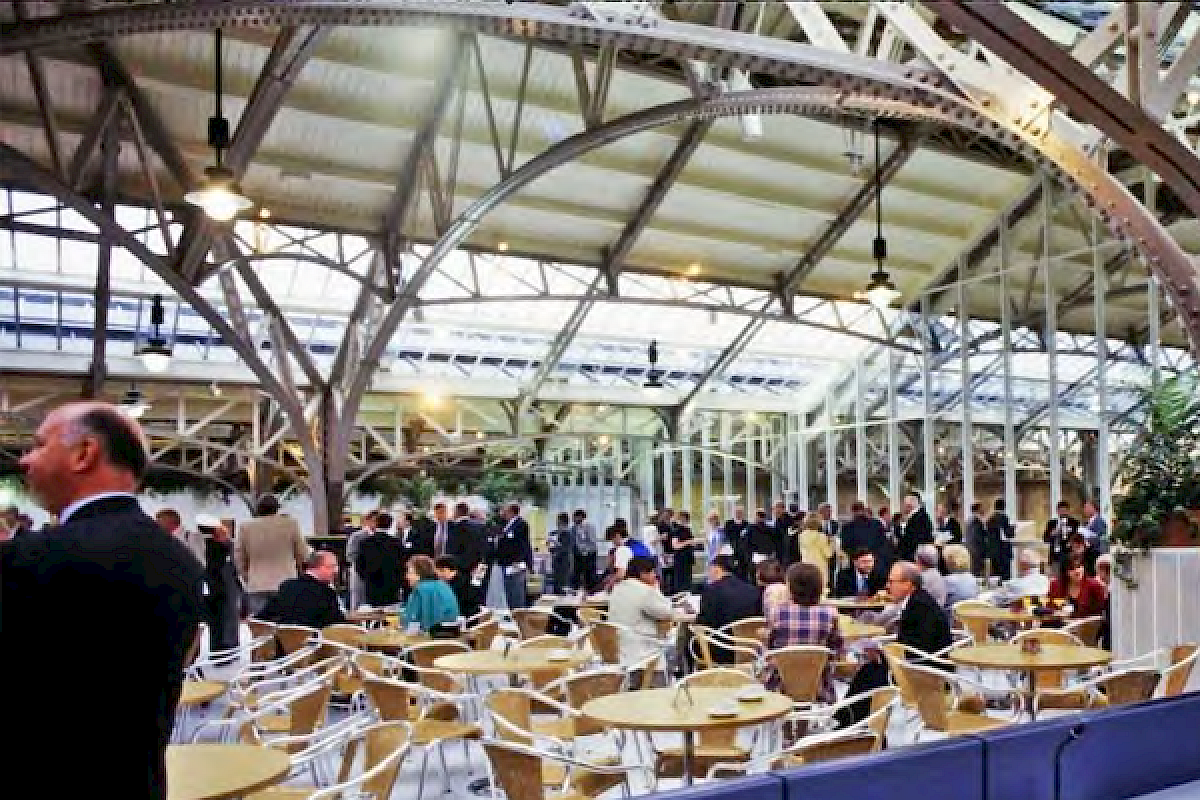
The following year the CE website, masterminded by Lepsoe, was launched at Seatrade. The diskette was being redesigned to run on Windows 95 and to include an itinerary planner.
At the AGM in Cadiz in 1999 Patrick Ryan of Royal Caribbean International spoke of nine new ships by summer 2002, with seven (RCI and Celebrity) to be deployed in Europe by 2003 compared to the present three. Membership numbered 69.
CE started gathering cruise statistics around about this time and It is interesting to note that in 1999 the top port in terms of cruiseship calls and passengers was Lisbon with 230 and 161,186 respectively, followed by St Petersburg with 187 and 114,517.
At Seatrade Miami in March 2000, an added attraction on the CE stand was ‘A taste of Europe’ with 10 members offering local specialities from their regions. A tradition that exists to this day.
At the 2002 AGM in Bergen/Flam, Lloyd’s Cruise International editor Sue Parker, later to become editor of Cruise Europe’s digital newsletter, said that 55 cruiseships with a total potential passenger volume of over 290,000 would be sailing in Northern Europe in 2002. Demand had more than doubled from 1 million in 1995 to 2.1 million in 2000 and was estimated to reach 3.1 million by 2007.
In 2004 at the AGM in Bilbao, provision was made for associate membership with the tourist boards of Copenhagen and Stockholm being admitted. During the same year, the International Ship & Port Security Code came in to effect.
Cruise Europe celebrated its 15th anniversary in 2006 with a happy hour on its stand at Seatrade Miami. Membership had grown to 93. Writing in the spring issue of Cruise Europe News, executive manager Mai Elmar attributed the success of the organisation, over and above the essentials of communication and marketing, down to enthusiasm, the diversification created by the membership and the professionalism gained by learning from fellow members.
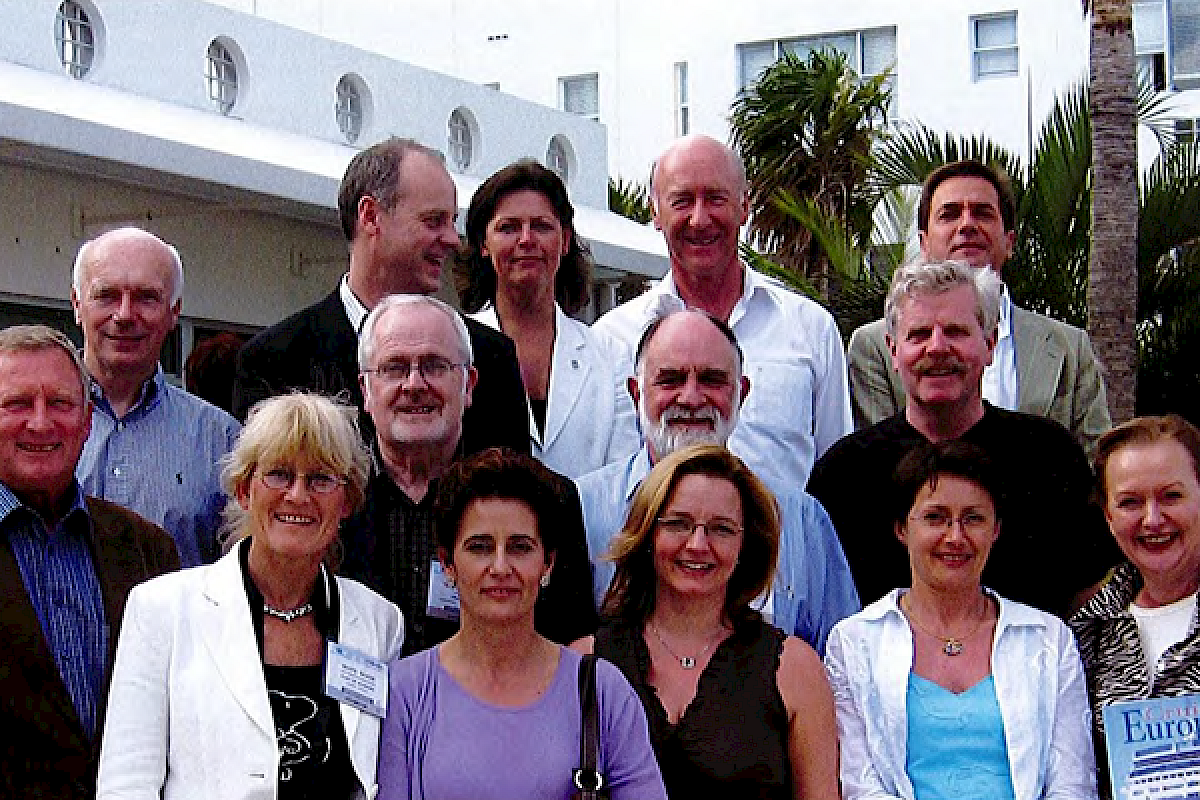
In addition the decision was taken to appoint a full-time salaried managing director. Enter Jens Skrede, who had previously been managing director of Destination Stryn and Nordfjord, and continues in the role today.
Cruise Europe's annual statistics demonstrated the incredible growth that was taking place in the region at this time. In 2008 7.86 million passengers were recorded on 6,333 calls compared with 6.44 million and 5,684 respectively in 2007.
At the AGM in Le Havre in 2013, cruise analyst Peter Wild stated that the European source market reached 6.2m out of the world total of 20.6m in 2012. MSC Cruises’ head of port operations Captain Luigi Pastena said that his company made 467 calls at European ports the previous year carrying 1.4 million passengers. He estimated overall port costs totalled €18.5m, of which port charges contributed 63%.
Just five years ago, on CE 25th anniversary, Lord Amrose Greenway (who has written a detailed history available as a pdf on the CE website) summarised the association thus:
Looking back there can be no doubting the fact that, whether by luck or judgement, Cruise Europe was formed at the right time and in the right place. The organisation has survived and prospered over its first 25 years of existence and its success can be measured by the fact that its membership has grown from an initial 21 to nearly 120 in 2016.
Five years down the track, the membership consists of 130 ports and 15 associated members. And, despite the pandemic, CE remains an integral and proactive player in the cruise industry. In the past 18 months it has worked hard to update its members and the wider industry on changing situations and protocols and constantly updated its information and protocols in line with the cruiseline needs.
As the industry slowly returns, CE will continue to support its members and the industry by keeping pace with the changes, evolving and engaging with topical issues ranging from revised itinerary planning to environmental operations such as providing LNG and shore power in port.
Just recently Captain Iain Dunderdale MBE commented on the association’s achievements: “Great oak trees from little acorns grow, and Cruise Europe has grown from modest beginnings to a worldwide leader in its field today.”
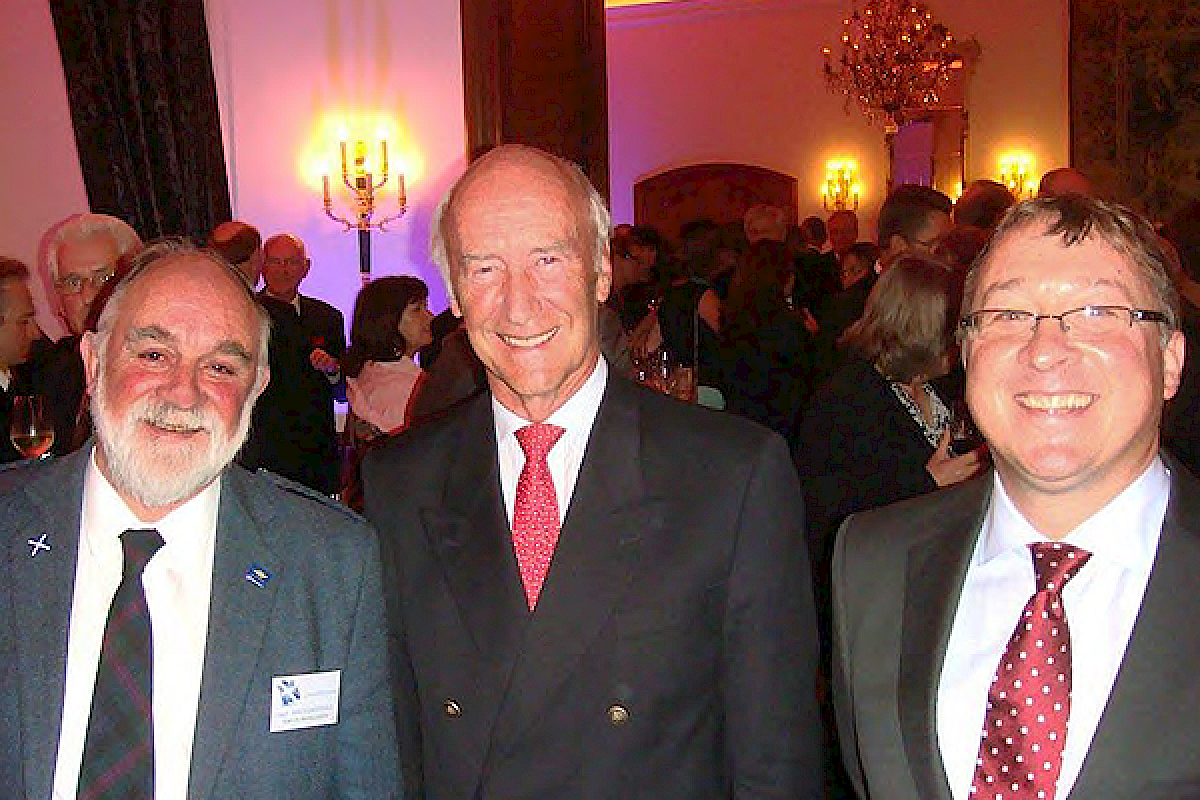
Current chair Michael McCarthy looks towards the future: “Since being elected as Chair in 2012, I have had the honour of serving with the most dedicated managing director, port executives on council and throughout the ports. We continue to fulfil the original vision of the organisation in promoting Europe as ‘the World’s leading sustainable cruise region’.
“Nobody can articulate the impact of the current pandemic on the cruise industry with catastrophic losses, downsizing of fleets, the removal of ‘older’ ships, and future capacity being moderated by the phased re-entry of ships and delays in new ship deliveries. However, the cruise industry is resilient and CE will continue to partner with the cruiselines, modernise our way of communication, strengthen and improve our media work and increase the activity of regional meetings.
“Full cruiseships will sail again and CE will continue to play a leading role in keeping abreast of environmental and sustainability issues in tackling climate change and the ‘greening’ of the industry.”
As Princess Cruises began to sail out of Seattle again, Crystal Morgan, director deployment planning, took time out to comment: “Cruise Europe has been a reliable partner for Princess Cruises and the cruise industry throughout the years. The association has provided a platform to leverage best practices across the region, as well as tackling major issues such as sustainability and most recently COVID-19 protocols.
“As Cruise Europe has grown throughout the years, it has provided an opportunity for emerging destinations to have a voice. I hope Cruise Europe continues for another 30 years. Thank you for the continued support and passion.”
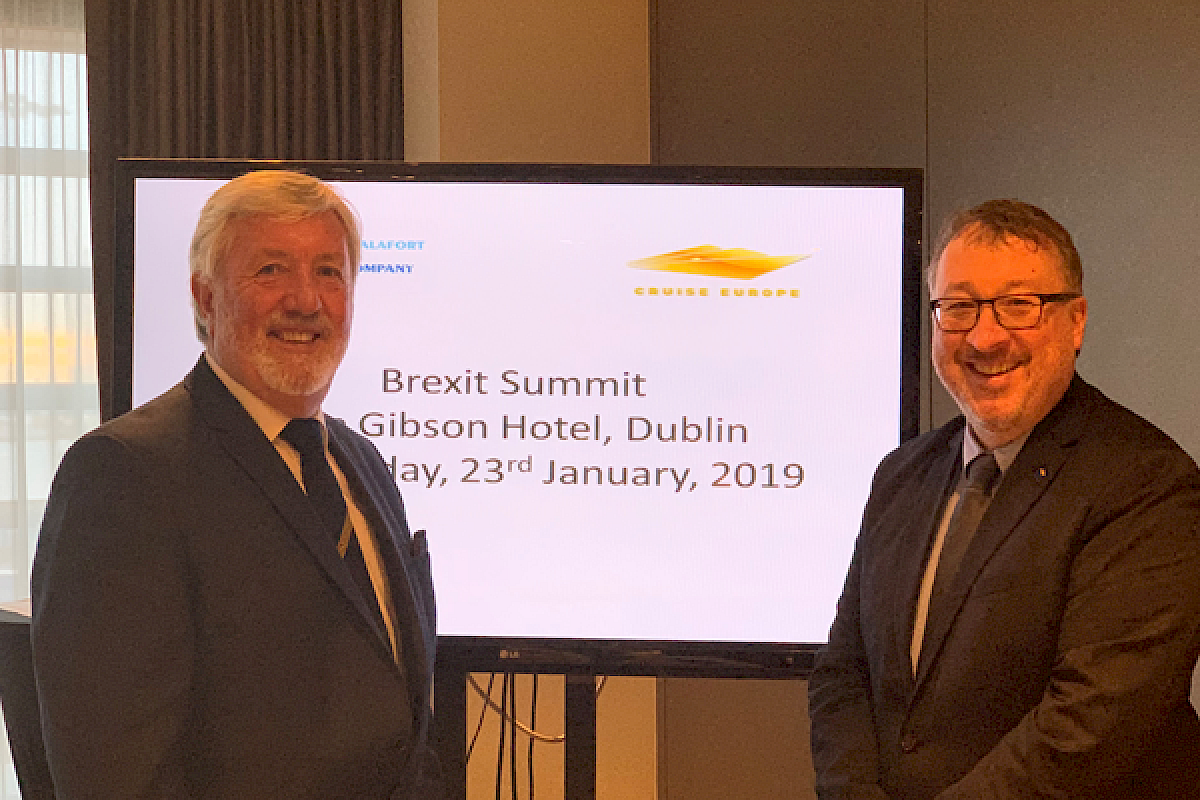
1992 Amsterdam
1993 Rouen
1994 St Peter Port, Guernsey
1995 Bordeaux
1996 Londonderry
1997 Amsterdam
1998 Invergordon
1999 Cadiz
2000 Stockholm/Mariehamn
2001 La Rochelle
2003 Tallinn
2004 Bilbao
2005 Cork
2006 Rotterdam
2007 Ronne, Bornholm
2008 Klaipeda
2009 Vigo
2010 Amsterdam
2011 Stavanger
2012 Greenwich
2013 Le Havre
2014 Riga
2015 Santander
2016 Dublin
2017 Bremerhaven/Bremen
2018 St Petersburg
2019 Bruges/Zeebrugge
2020 na
2021 Trondheim(virtual)
2022 Edinburgh
2023 Lisbon
2024 Stockholm